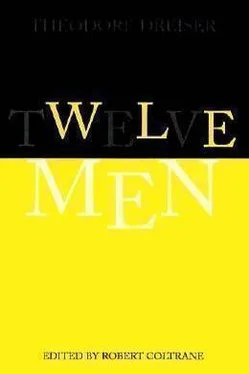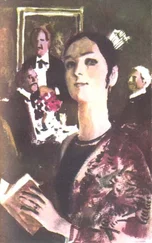Теодор Драйзер - Twelve Men
Здесь есть возможность читать онлайн «Теодор Драйзер - Twelve Men» весь текст электронной книги совершенно бесплатно (целиком полную версию без сокращений). В некоторых случаях можно слушать аудио, скачать через торрент в формате fb2 и присутствует краткое содержание. Год выпуска: 2014, Издательство: epubBooks Classics, Жанр: Биографии и Мемуары, на английском языке. Описание произведения, (предисловие) а так же отзывы посетителей доступны на портале библиотеки ЛибКат.
- Название:Twelve Men
- Автор:
- Издательство:epubBooks Classics
- Жанр:
- Год:2014
- ISBN:нет данных
- Рейтинг книги:4 / 5. Голосов: 1
-
Избранное:Добавить в избранное
- Отзывы:
-
Ваша оценка:
- 80
- 1
- 2
- 3
- 4
- 5
Twelve Men: краткое содержание, описание и аннотация
Предлагаем к чтению аннотацию, описание, краткое содержание или предисловие (зависит от того, что написал сам автор книги «Twelve Men»). Если вы не нашли необходимую информацию о книге — напишите в комментариях, мы постараемся отыскать её.
Twelve Men — читать онлайн бесплатно полную книгу (весь текст) целиком
Ниже представлен текст книги, разбитый по страницам. Система сохранения места последней прочитанной страницы, позволяет с удобством читать онлайн бесплатно книгу «Twelve Men», без необходимости каждый раз заново искать на чём Вы остановились. Поставьте закладку, и сможете в любой момент перейти на страницу, на которой закончили чтение.
Интервал:
Закладка:
He once told his brother–in–law that one New Year's Day a voice called to him in church: "Elihu Burridge, how about the lonely rich and poor of Noank?" "Up I got," he concluded, "and from that day to this I have never neglected them."
When any one died who had a little estate to be looked after for the benefit of widows or orphans, Burridge was the one to take charge of it. People on their deathbeds sent for him, and he always responded, taking energetic charge of everything and refusing to take a penny for his services. After a number of years the old judge to whom he always repaired with these matters of probate, knowing his generosity in this respect, also refused to accept any fee. When he saw him coming he would exclaim:
"Well, Elihu, what is it this time? Another widow or orphan that we've got to look after?"
After Elihu had explained what it was, he would add:
"Well, Elihu, I do hope that some day some rich man will call you to straighten out his affairs. I'd like to see you get a little something, so that I might get a little something. Eh, Elihu?" Then he would jocularly poke his companion in charity in the ribs.
These general benefactions were continuous and coeval with his local prosperity and dominance, and their modification as well as the man's general decline the result of the rise of this other individual—Robert Palmer,—"operating" to take the color of power and preëminence from him.
Palmer was the owner of a small shipyard here at the time, a thing which was not much at first but which grew swiftly. He was born in Noank also, a few years before Burridge, and as a builder of vessels had been slowly forging his way to a moderate competence when Elihu was already successful. He was a keen, fine–featured, energetic individual, with excellent commercial and strong religious instincts, and by dint of hard labor and a saving disposition he obtained, soon after the Civil War, a powerful foothold. Many vessels were ordered here from other cities. Eventually he began to build barges in large numbers for a great railroad company.
Early becoming a larger employer of labor than any one else in the vicinity he soon began to branch out, possessed himself of the allied industries of ship–rigging, chandlering, and finally established a grocery store for his employees, and opened a hotel. Now the local citizens began to look upon him as their leading citizen. They were always talking of his rise, frequently in the presence of Burridge. He said nothing at first, pretending to believe that his quondam leadership was unimpaired. Again, there were those who, having followed the various branches of labor which Palmer eventually consolidated, viewed this growth with sullen and angry eyes. They still sided with Burridge, or pretended still to believe that he was the more important citizen of the two. In the course of time, however—a period of thirty years or more—some of them failed; others died; still others were driven away for want of a livelihood. Only Burridge's position and business remained, but in a sadly weakened state. He was no longer a man of any great importance.
Not unnaturally, this question of local supremacy was first tested in the one place in which local supremacy is usually tested—the church where they both worshiped. Although only one of five trustees, Burridge had been the will of the body. Always, whatever he thought, the others had almost immediately agreed to it. But now that Palmer had become a power, many of those ardent in the church and beholden to him for profit became his humble followers. They elected him trustee and did what he wished, or what they thought he wished. To Burridge this made them sycophants, slaves.
Now followed the kind of trivialities by which most human feuds are furthered. The first test of strength came when a vagrant evangelist from Alabama arrived and desired to use the church for a series of evening lectures. The question had to be decided at once. Palmer was absent at the time.
"Here is a request for the use of the church," said one of the trustees, explaining its nature.
"Well," said Burridge, "you'd better let him have it."
"Do you think we ought to do anything about it," the trustee replied, "until Mr. Palmer returns?"
Although Burridge saw no reason for waiting, the other trustees did, and upon that the board rested. Burridge was furious. By one fell stroke he was put in second place, a man who had to await the return of Palmer—and that in his own church, so to speak.
"Why," he told some one, "the rest of us are nothing. This man is a king."
From that time on differences of opinion within the church and elsewhere were common. Although no personal animosity was ever admitted, local issues almost invariably found these two men opposed to each other. There was the question of whether the village should be made into a borough—a most trivial matter; another, that of creating public works for the manufacture of gas and distribution of water; a third, that of naming a State representative. Naturally, while these things might be to the advantage of Palmer or not, they were of no great import to Burridge, but yet he managed to see in them an attempt or attempts to saddle a large public debt upon widows and orphans, those who could not afford or did not need these things, and he proceeded to so express himself at various public meetings. Slowly the breach widened. Burridge became little more than a malcontent in many people's eyes. He was a "knocker," a man who wanted to hold the community back.
Although defeated in many instances he won in others, and this did not help matters any. At this point, among other things the decay of the fishing industry helped to fix definitely the position of the two men as that of victor and vanquished. Whaling died out, then mackerel and cod were caught only at farther and farther distances from the town, and finally three– and even two–masted schooners ceased entirely to buy their outfits here, and Burridge was left dependent upon local patronage or smaller harbor trade for his support. Coextensively, he had the dissatisfaction of seeing Palmer's industries grow until eventually three hundred and fifty men were upon his payrolls and even his foremen and superintendents were considered influential townspeople. Palmer's son and two daughters grew up and married, branched out and became owners of industries which had formerly belonged to men who had traded with Burridge. He saw his grocery trade dwindle and sink, while with age his religiosity grew, and he began to be little more than a petty disputant, one constantly arguing as to whether the interpretation of the Bible as handed down from the pulpit of what he now considered his recalcitrant church was sound or not. When those who years before had followed him obediently now pricked him with theological pins and ventured to disagree with him, he was quick and sometimes foolish in his replies. Thus, once a former friend and fellow–church–member who had gone over to the opposition came into his store one morning and said:
"Elihu, for a man that's as strong on religion as you are, I see you do one thing that can't quite be justified by the Book."
"What's that?" inquired Burridge, looking up.
"I see you sell tobacco."
"I see you chew it," returned the host grimly.
"I know I do," returned his visitor, "but I'll tell you what I'll do, Elihu. If you'll quit selling, I'll quit chewing it," and he looked as if he had set a fancy trap for his straw–balancing brother, as he held him to be.
"It's a bargain," said Burridge on the instant. "It's a bargain!"
And from that day on tobacco was not offered for sale in that store, although there was a large local demand for it.
Again, in the pride of his original leadership, he had accepted the conduct of the local cemetery, a thing which was more a burden than a source of profit. With his customary liberality in all things reflecting credit upon himself he had spent his own money in improving it, much more than ever the wardens of the church would have thought of returning to him. In one instance, when a new receiving vault was desired, he had added seven hundred dollars of his own to three hundred gathered by the church trustees for the purpose, and the vault was immediately constructed. Frequently also, in his pride of place, he had been given to asserting he was tired of conducting the cemetery and wished he could resign.
Читать дальшеИнтервал:
Закладка:
Похожие книги на «Twelve Men»
Представляем Вашему вниманию похожие книги на «Twelve Men» списком для выбора. Мы отобрали схожую по названию и смыслу литературу в надежде предоставить читателям больше вариантов отыскать новые, интересные, ещё непрочитанные произведения.
Обсуждение, отзывы о книге «Twelve Men» и просто собственные мнения читателей. Оставьте ваши комментарии, напишите, что Вы думаете о произведении, его смысле или главных героях. Укажите что конкретно понравилось, а что нет, и почему Вы так считаете.









